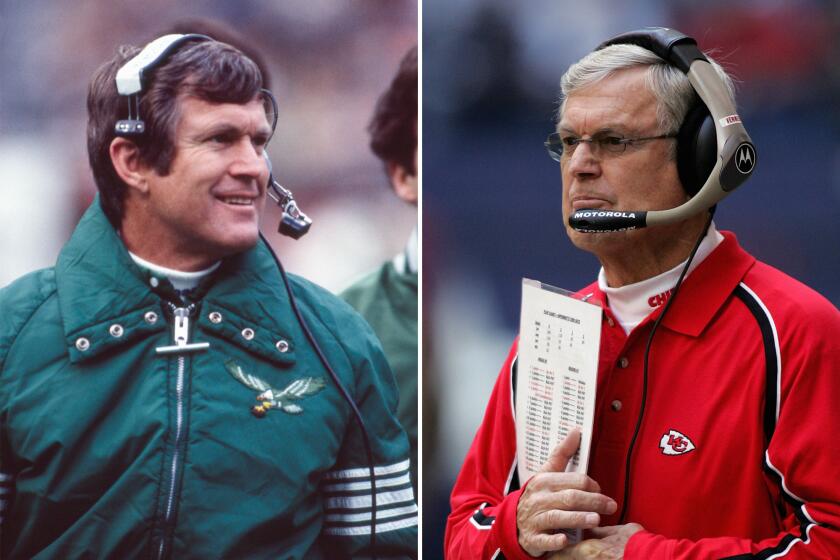Irwindale and the Raiders
- Share via
There are two separate controversies involving the town of Irwindale, but they are intertwined in ways that raise questions about the protection of the public interest and the propriety of political decisions.
The first and most conspicuous issue is the decision of the Los Angeles Raiders to transfer the professional football team’s home games to a stadium to be built in Irwindale. Many in Los Angeles regret this loss for the Coliseum, and also regret the breakdown in negotiations between the Coliseum and Al Davis, proprietor of the Raiders, that led Davis to conclude that the Coliseum Commission broke promises to improve the stadium. That dispute is now the subject of litigation.
Davis has negotiated a deal with Irwindale that no team owner in his right mind would refuse: a $10-million cash grant that he may keep whether or not the deal is implemented, plus a new stadium, new practice facilities, new hall of fame and new parking--all to be ready by the 1990-91 season at no expense to him and his Raiders.
Whether officials of Irwindale have acted in the best interests of their constituents remains to be seen. And that brings up the other issue: the probity of government in Irwindale.
It is an unusual community, with a population of just a few more than 1,000, a sociopolitical structure dominated by four families, an interrelationship among officials and city employees that is riddled with nepotism. Irwindale voters have every reason to support whatever goes on at City Hall because the community’s economic boom is shared generously with residents. Each home-owner is eligible for a $10,000 home-improvement grant, free optical work and senior-citizen center services, and the prospect of free major medical, dental and prescription-drug services.
This happy circumstance is the result of having more money coming in from giant industries and businesses than the city knows how to use. The giant entrepreneurs have been attracted by the relatively low taxes. And in this mutual collaboration, awash with revenues, there has developed a climate that risks corruption.
City officials have confirmed the findings of an investigation by The Times that they have profited from contracts awarded by the city to enterprises in which they hold substantial financial stakes. No law has been broken, they assert, while acknowledging that there might be, to outsiders, an appearance of impropriety. They have agreed, however, to cooperate fully should there be an investigation by the Grand Jury. So they should.
Irwindale officials have interpreted the revelations of questionable financial dealing as part of a campaign by this newspaper to undermine the Raiders’ move. It was not. Its publication at this time was a coincidence. We encouraged the decision of Davis to move his team to Los Angeles. We have had doubts about key elements of Raider plans to remodel the Coliseum. Davis’ pursuit of a better deal is subject only to the laws that control commercial enterprises. Irwindale’s response, involving public funds and public lands, is subject to the laws that protect the public interest--an interest that extends beyond the public as constituted in the population of Irwindale itself.
More to Read
Go beyond the scoreboard
Get the latest on L.A.'s teams in the daily Sports Report newsletter.
You may occasionally receive promotional content from the Los Angeles Times.










